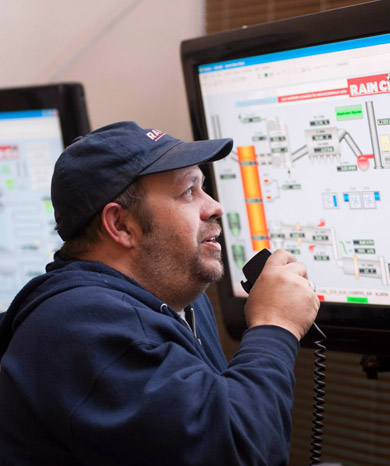Production of top-quality raw materials makes Rain Carbon a coveted supplier of carbon products and advanced materials. Global customers also count on us to meet their unique needs and requirements.
We employ experts who operate globally and plan meticulously on a long-term basis — to secure the transportation of our products at all times and to serve the world’s markets as trading partners in the traditional sense.
One-stop logistics and trading
Our logistics operations work to ensure on-time shipment of products directly to our customers across the world’s transportation routes. This minimizes risks and ensures that deadlines are reliably met. Utilizing our intimate knowledge of markets, raw material suppliers, manufacturers and customers from various industrial sectors, we trade in aromatics and naphthalene products throughout the world.
- Logistics
- Technical Services

Trade demands logistics. We have the solution.
To ensure our customers have the raw materials needed to keep their plants running, Rain Carbon's specialists can organize reliable product shipments by rail and road, or by sea and inland waterways. Nothing is left to chance. In 1992, we set new standards with the first worldwide shipment of fluid pitch -- and we continue to implement logistics best practices to support our customers. Access to the sea has always been an important criteria while selecting plant sites. This is why most of our production facilities are situated at inland or marine ports, which makes transport easier and more efficient.
Secure deliveries. High storage capacities.
Customers need raw materials to arrive just in time. With a storage capacity of 7,500 mega tons in Rotterdam and an additional 3,000 tons overseas, we have the flexibility to react to changing markets to ensure customers receive raw materials when and where they need them. We also have signed a long-term contract for the rental of Eiltank 77, with a storage volume of 2,480 m3 of electrode binder. It can ship temperature-controlled cargos across the world. In addition, we have several other river barges and ocean ships in our long-term contractual service including Scot Breman, Ursula Valentin, RAIN Empress and Iver Ambition.

Rain Carbon Inc. has a strong customer focus and a long history of working collaboratively with customers to provide technical support and solutions for our customers and suppliers, particularly those associated with the aluminum industry.
Calcined petroleum coke (CPC) plays a critical role in the aluminum industry, serving as a key raw material in the anodes used in the electrolytic process. CPC is a naturally heterogeneous material that is derived from green petroleum coke (GPC) -- a byproduct of the refining process -- and the quality and composition of both GPC and CPC are gradually changing due to evolutions in the petroleum refining industry. It is important for Rain Carbon Inc. to work closely with customers and suppliers to manage these quality changes.
Smelters produce and consume large numbers of anodes. Consistent anode quality is critical to maintain a stable aluminum smelter operation. Although all anode plants use the same basic process for the production of anodes, differences in process and equipment affect anode quality.
Supply interruptions and inconsistent quality of CPC can disrupt smelting operations and erode profit margins. Emerging supply and quality constraints can threaten a smelter's success. Rain Carbon Inc. has the resources, expertise and commitment to help meet these challenges.
Our technical services and R&D include:
- Frequent customer visits with detailed quality and technical review meetings
- Close dialogue with refinery suppliers supported by frequent visits and feedback on quality and technical issues
- Audits of plant operations to identify potential improvement opportunities, and provision of technical resources to identify and resolve quality and process inefficiencies
- Provision of laboratory work on specific projects for customers
- An active laboratory R&D program to develop new GPC and CPC sources for the industry, as well as other technology-related improvements
- Sponsorship of external R&D work to support in-house R&D activities
- Initiation and management of industry-wide round robin programs
- Organization of Carbon Symposiums, which provide an opportunity to share knowledge on CPC- and anode-related issues
- Frequent participation and presentation at conferences around the world
- Publication of technical papers on issues relevant to the industry; many of these papers can be found in the Innovation section